- Home Page
- Paper Kites
- ... Rokkaku Kite
How to Make a Paper Rokkaku Kite
Step by Step—Page 1 of 3
The MBK Paper Rokkaku
Learn how to make a paper rokkaku kite with these easy-to-follow instructions. It's fully illustrated with closeup photographs every step of the way.
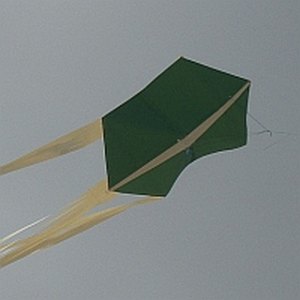 MBK Paper Rokkaku
MBK Paper RokkakuThese instructions take you step by step through making a small but
high-flying rokkaku kite—all from several pieces of A4 or Letter
size copier paper and some sticking tape!
This kite performs well in gentle to moderate wind speeds. That's from 12 to 28 kph or from 8 to 18 mph. Even quite a small child should be able to hang on to the winder once the kite is up.
This little rok is somewhat unique in that it sports a completely rigid vertical spar. But have a look at the photo: See how the spar is kinked in the middle, which helps the kite behave like a more conventional rokkaku with its curved vertical spar.
On this site, there's more kite-making info than you can poke a stick at. :-)
Want to know the most convenient way of using it all?
The Big MBK E-book Bundle is a collection of downloads—printable PDF files which provide step-by-step instructions for many kites large and small.
That's every kite in every MBK series.
How to Make a Paper Rokkaku Kite
The Sail
Tack Paper Sheets Together
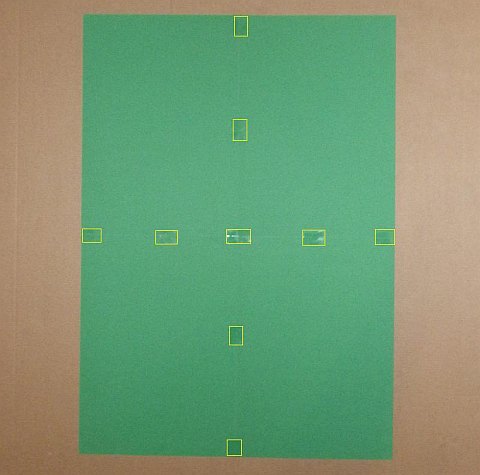 Four sheets of paper tacked together
Four sheets of paper tacked together- Orient the four sheets as shown. The paper color(s) are up to you!
- Bring the sheets of paper together, and tack in place with short strips of sticking tape. Yellow lines show where the edges of the tape are. You'll be seeing plenty of those yellow lines from here on!
Measure on One Side
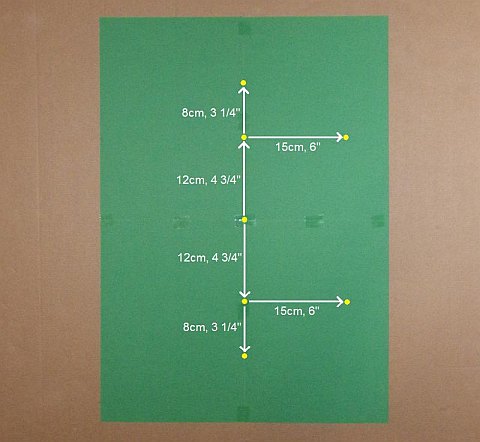 Sail corners measured and marked
Sail corners measured and marked- Start measuring from the point where all four sheets of paper meet—the central dot in the photo.
- Using a pencil, make dark dots on the paper, following the arrows shown above. I have added yellow dots to make the positions clear.
- Note how dots are placed either on the centerline from top to bottom or to the right of the centerline.
Fold Along the Centerline
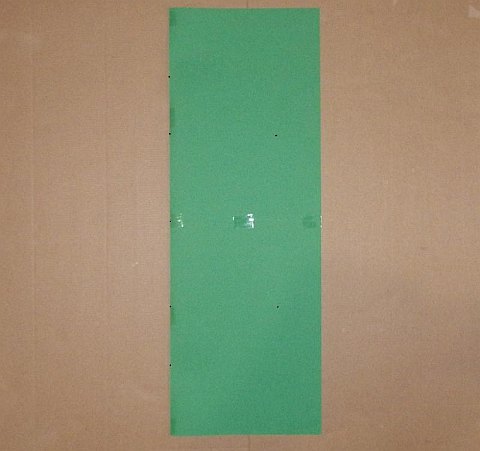 Paper sheets folded
Paper sheets folded- Fold the four sheets along the centerline, leaving the dots on the outside.
- Place the paper up against a window while there is some light outside.
- Trace the two dots, seen near the right edge of the paper in the photo, onto the unmarked side.
Note: What if the paper is too dark to see through? Just poke a hole through each dot with a needle so you can see where to put a dot on the unmarked side!
Draw Sail Shape
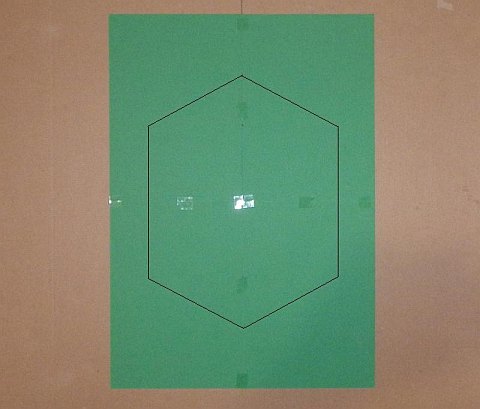 Lines drawn between dots
Lines drawn between dots- Unfold the paper, and lay it down.
- Using a pencil and ruler, connect the dots as shown in the photo.
Note: The lines in the photo are enhanced so you can see them easier.
Apply Tape
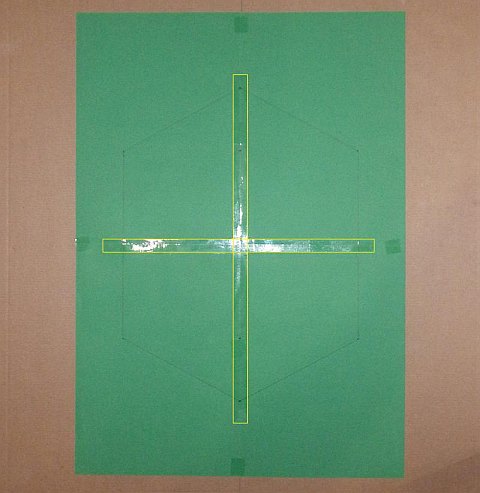 Tape laid down
Tape laid down- Apply sticking tape as indicated by the yellow rectangles in the photo. The ruled lines haven't been enhanced in this photo!
Cut Sail Shape
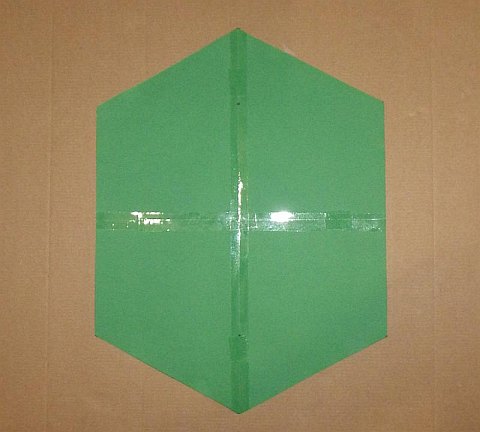 Sail cut out
Sail cut out- With scissors, cut all around the sail shape. There it is in the photo.
Draw Vertical Guide Lines
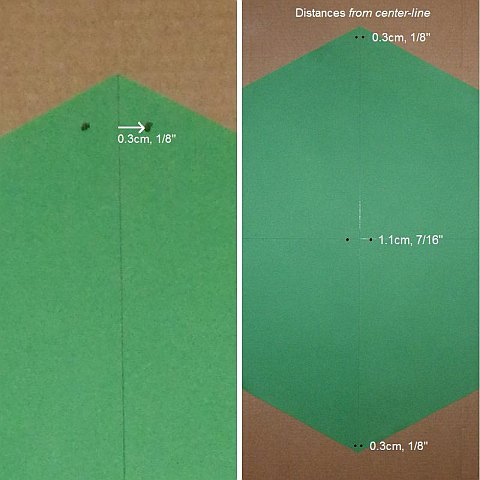 Dots drawn for vertical guide lines
Dots drawn for vertical guide lines- Lay down the sail so the sticking tape is against the floor.
- Near the top of the sail, make a dot on each side of the centerline, 0.3 cm (1/8 in.) from the line. See the photo on the left up there.
- Where the four pieces of paper meet, also make a dot on each side of the centerline, but 1.1 cm (7/16 in.) from the line.
- Similarly, make a pair of dots near the bottom end of the centerline, 0.3 cm (1/8 in.) from the line. The photo on the right shows all three pairs of dots.
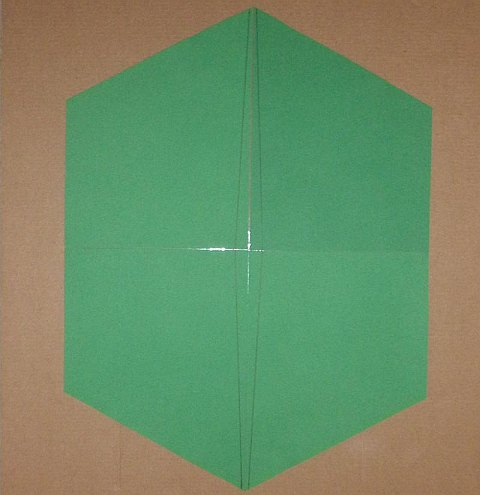 All vertical guide lines drawn
All vertical guide lines drawn- Rule four straight lines through all the dots as shown. OK, so they are not quite vertical, strictly speaking!
Draw Horizontal Guide Lines
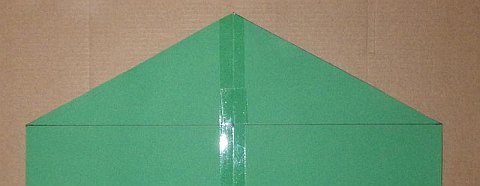 Line drawn from corner to corner
Line drawn from corner to corner- Flip the sail over, and rule a line all the way from one upper corner to the other. The distance is 30 cm, so a standard ruler will be just long enough.
 Left top of sail—dots marked above and below the line
Left top of sail—dots marked above and below the line- Mark dots, 0.3 cm (1/8 in.) away from the line near the paper corner and 1.1 cm (7/16 in.) away from the line near the sticky tape. See the closeup photo.
- Do the same on the right-hand side of the paper like a mirror image.
- Rule a line between the lower two corners of the sail, and do all eight dots again. If you take a peek at the next page, it should all be clear.
Note: Only the distance away from the line needs to be accurate; the distances from the middle and from the corners can be done by eye from the photo.
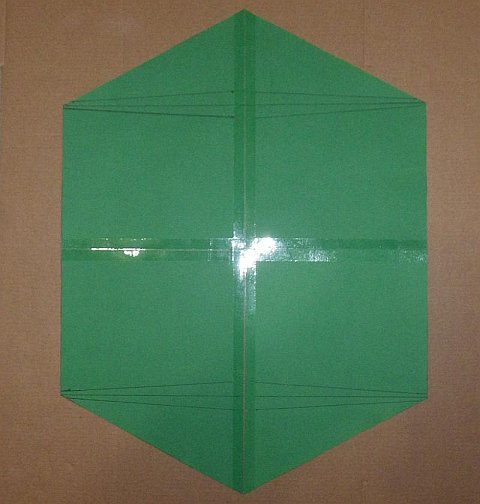 Spar guide-lines drawn through all the dots
Spar guide-lines drawn through all the dots- Using your ruler, draw lines through all the dots as shown.
The Vertical Spar
Measure Shapes
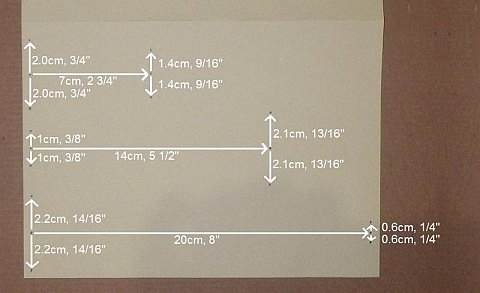 Measured and dots marked
Measured and dots marked- The bottom of the photo above is a short edge of the paper. Measure and mark dots where indicated in the photo.
Note: Keep the dots within half the area of the paper. You can crease the paper in the middle, open out, and then keep the dots on one side of the crease. See the crease near the top of the photo.
Draw Lines
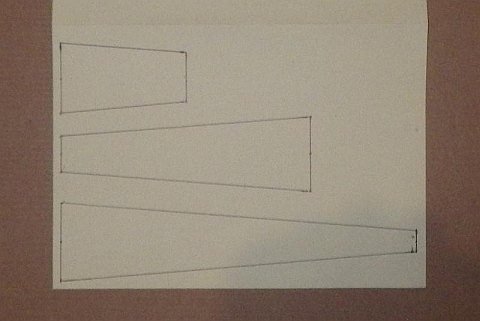 Lines drawn between dots
Lines drawn between dots- Using your ruler, connect the dots as shown. As you can see in the photo, you don't need a line drawn across the middle of each shape.
Duplicate Shapes
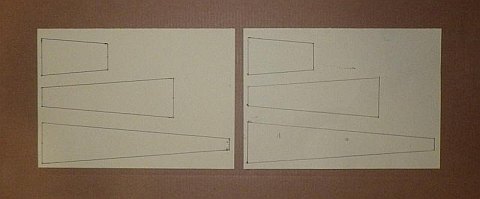 The three shapes duplicated
The three shapes duplicated- Fold down the unmarked half of the paper.
- Trace dots at the positions of the shape corners. Up against a window works well, with sunshine lighting up both thicknesses of paper from behind.
- Tear the paper in half along the crease.
- Rule lines between the corner dots. There's the original and the copy in the photo.
Note: If you have trouble tracing due to dark paper or insufficient light: With a needle, poke holes through the two sheets of paper at the corners of the shapes. Be careful not to let them shift! Then, after tearing the paper in half, rule lines between the pinholes on the blank sheet.
Tape Over
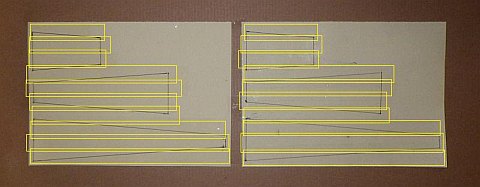 Shapes taped
Shapes taped- Lay strips of sticking tape over the spar shapes as illustrated in the photo.
- The strips of tape can overlap slightly and should cover the shapes completely. That's the only requirement!
Cut Out
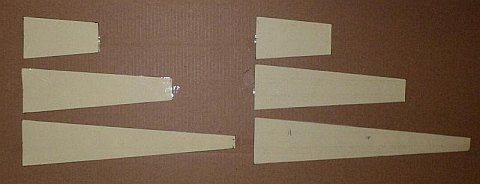 Shapes cut out
Shapes cut out- Cut out the shapes, which will be totally covered in tape on one side. A little bit of curl is OK; the ones in the photo have been stuck down!
Note: The middle shapes have been rotated around. In the next step you will layer each group of three.
Stick Together
 Longest and mid-sized shapes stuck together
Longest and mid-sized shapes stuck together- Lay down both the longest shapes with the taped sides facing down.
- Lay a midsize shape over the top of each longer shape, also with the taped sides facing down.
- Line up the wide ends exactly, shift the top shape up or down to center it over the lower shape, then stick in place with tape. Also, tack down the narrower end with a square of tape as shown in the photo.
 Shortest shapes added
Shortest shapes added- Now line up the remaining shapes, taped sides down. Use sticking tape at both ends as before.
Encase in Tape
 Tape laid down over one long edge
Tape laid down over one long edge- Lay a strip of sticking tape the full length of one spar, leaving half the width overhanging.
 Tape folded around long edge
Tape folded around long edge- Fold the overhanging tape around so it sticks to the other side.
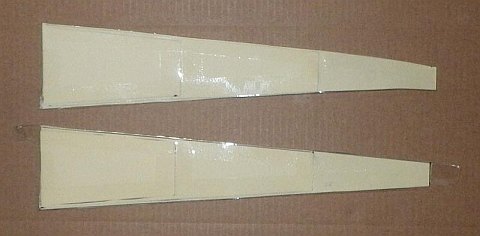 Tape laid and folded around both long edges of both spar pieces
Tape laid and folded around both long edges of both spar pieces- In the same way, wrap tape around the three remaining long edges so both spar pieces are almost completely encased in sticky tape.
- Using scissors, trim any overhanging tape from the short edges of the paper.
Wide End Cuts
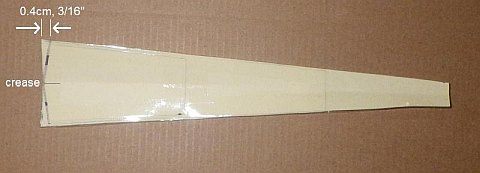 Measured and lines drawn on one spar piece
Measured and lines drawn on one spar piece- Take a spar piece, and fold in half near the wide end. Create a crease line near the edge. It doesn't really matter which way up the paper is.
- Carefully measure 0.4 cm (3/16 in.) along each long edge, and make a small dot on each edge.
- Draw lines from the dots to the end of the crease as shown in the photo.
- Measure and draw lines on the other spar piece in the same way.
Note 1: A thin gray line has been added to
show where the crease is.
Note 2: A felt-tip pen will make it easier to leave marks on the sticking tape!
 Cuts done on both spar pieces
Cuts done on both spar pieces- Using scissors, cut along the two ruled lines on both spar pieces. See the photo.
As mentioned earlier, there's more kite making on this site than you can poke a stick at. :-)
Want to know the most convenient way of using it all?
The Big MBK E-book Bundle is a collection of downloads—printable PDF files which provide step-by-step instructions for many kites large and small.
That's every kite in every MBK series.
